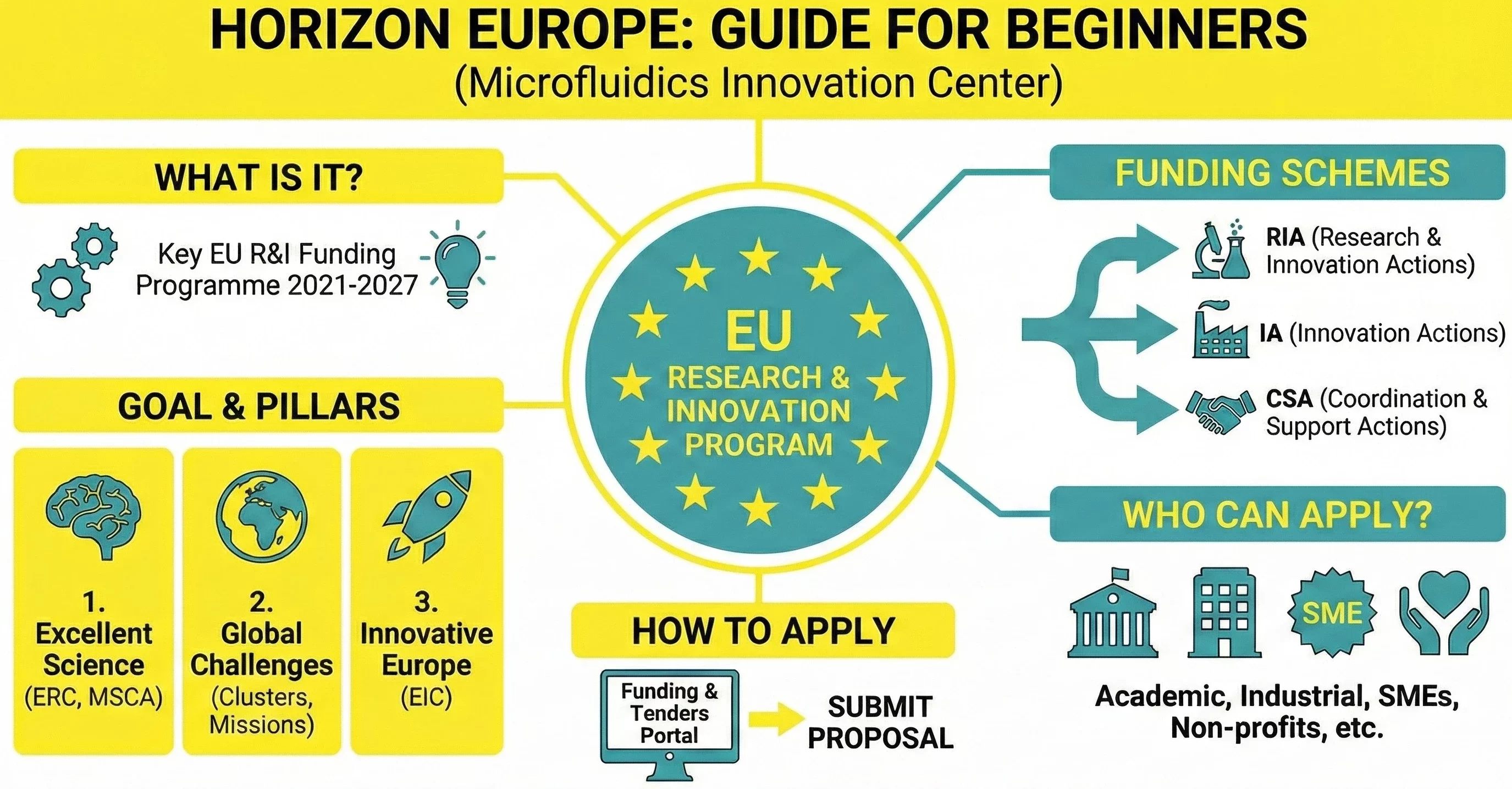Horizon Europe: Guide for beginners
Author
Marlene Kopf, PhD
Publication Date
October 10, 2024
Keywords
Horizon Europe pillars
EU innovation funding
EU priorities & policies
Funding & Tenders Portal
Consortium building
Open science
Global challenges
EU competitiveness
European Innovation Council
Your microfluidic SME partner for Horizon Europe
We take care of microfluidic engineering, work on valorization and optimize the proposal with you
Learn about the first steps in getting closer to a successful Horizon Europe project.
Horizon Europe is the European Union’s flagship research and innovation funding programme for 2021-2027, with a budget of €93.5 billion. Understanding this programme can open up significant funding opportunities for your research. Learn with our Horizon Europe guide what you need to know to get started.

What is Horizon Europe?
Horizon Europe is designed to tackle global challenges, boost the EU’s competitiveness, and support EU policies. It funds a wide range of research and innovation activities, from basic research to applied science and market-ready innovations.

Programme structure
Horizon Europe is organized into three main pillars:
1. Excellent science
Supports frontier research, including Marie Skłodowska-Curie Actions for researcher mobility.
2. Global challenges and European industrial competitiveness
Addresses societal challenges and industrial technologies.
3. Innovative Europe
Focuses on breakthrough innovations and market-creating solutions.

Key features of the Horizon Europe programme

1) Open science: Mandatory open access to publications and emphasis on open science principles.
2) Missions: Goal-oriented approach to tackle specific challenges, such as climate change or cancer research.
3) European Innovation Council: Supports high-risk, high-impact innovations with scale-up potential.
How to get started
In our Horizon Europe guide for beginners, we recommend these first steps:
1) Identify suitable calls: Browse the Horizon Europe work programmes to find relevant funding opportunities in your field.
2) Form a consortium: Most projects require collaboration with partners from at least three different EU member states or associated countries.
3) Register on the Funding & Tenders portal: Create an account on the Funding and Tenders Portal and obtain a Participant Identification Code (PIC) for your organization.

4) Prepare your proposal: Focus on the three key sections:
- Excellence: Outline your project’s objectives and methodology.
- Impact: Describe the expected outcomes and their significance.
- Implementation: Detail your work plan and consortium structure.
Submit your proposal: Follow the guidelines carefully and submit before the deadline.
Tips for success
1) Understand evaluation criteria: Familiarize yourself with how proposals are assessed to improve your chances of success.
2) Consider the broader context: Align your project with EU priorities and policies.
3) Seek support: Get in touch with your National Contact Point (NCP) for guidance and advice.
4) Find more tips for a successful project proposal on our website.
This is the next level after our Horizon Europe guide for beginners.

In a nutshell
Horizon Europe offers exciting opportunities for natural scientists to secure funding for groundbreaking research. By understanding the programme’s structure and requirements, you can increase your chances of submitting a competitive proposal. Remember, successful applications often require time, effort, and collaboration, so start early and seek support when needed.
By going through this Horizon Europe guide for beginners, you have done a step into the right direction! To go further, you will get more information on our website, on the websites of the European Commission, e.g. here and here, and from your National Contact Point, e.g. here.
The European Commission offers several online trainings related to proposal writing on this website.

Check the Horizon Europe tips and tricks
FAQ – Horizon Europe: Guide for beginners
1) What is Horizon Europe, in one sentence?
The European Union has a flagship research and innovation programme, Horizon Europe 2021-2027, with a budget of EUR93.5 billion to finance all blue-sky science and near-market innovation.
2) Who was this guide to beginners supposed to be?
It is authored at the level of researchers and innovators who have no prior experience in EU funding i.e. usually people who have never organized or participated in a Horizon project and want a first introduction to the programme: what the programme looks like, how calls are made, and what real steps to take to get beyond “this looks interesting” to a proposal that gets submitted.
3) The structure of Horizon Europe? What are these “three pillars”?
Horizon Europe will be structured into 3 major pillars:
-Excellent Science – contributes to frontier research and preparation, as well as the Marie Sklodowska-Curie Actions (MSCA) of researcher mobility.
-Global Challenges and European Industrial Competitiveness – finances initiative projects that deal with societal issues and core enabling technologies.
-Innovative Europe – is dedicated to breakthrough innovation and market-creating businesses, chiefly through the European Innovation Council (EIC).
In case you are doing academic research, you will most frequently land in Pillar I or II; deep-tech SMEs will typically consider Pillar III.
4) What are the main characteristics of Horizon Europe that I must know since day one?
When you begin to formulate ideas, three features are pertinent, which are:
-Open science – publications are obligatory open access and data management is also seriously considered.
-Missions – certain funding is mission-based (e.g. climate resilience, cancer), projects tend to be given in relation to defined mission aims that are supposed to be met by the projects.
-European Innovation Council (EIC) – a specific structure of high risk, high impact innovation with massive scale-up potential (Pathfinder, Transition, Accelerator).
Knowing where to place your idea within such a landscape saves a good deal of time in the future.
5) I’m a complete beginner. What are the initial tangible actions to take in order to bring a funded project closer?
The guide recommends a straightforward, realistic order:
-Find appropriate calls – learn about the Horizon Europe work programmes and find the suitable topic to match your idea.
-Create a consortium – on the majority of collaborative projects you will require at least three partners who are based in EU Member States or other associated countries.
-Register on the Funding and Tenders Portal – create an account and receive a Participant Identification Code (PIC) to your organisation.
-Write your proposal – design it in accordance with the required sections: Excellence, Impact, Implementation.
-Bring in time – adhering to page restrictions, templates and any other formal guidelines.
The beginner’s article is actually on how to get through steps 1-4 without losing track.
6) What then will be included in the Excellence, Impact and Implementation sections?
The guide brings out three fundamental blocks that you will encounter in nearly all Horizon templates:
-Excellence – your aims, state of art and methodology; here you persuade the specialists that the science/technology sound and ambitious.
-Impact – who will it benefit, how your results will transform the field or market and how it would fit the EU policies and missions.
-Implementation – work plan, work packages, schedule, risk management and why your consortium can deliver.
One of the beginner pitfalls is to pay excessive attention to Excellence and ignore Impact and Implementation; all three are assessed by evaluators.
7) What should I consider with regard to consortia when I am new?
You have at least to be respectful to the formal rule (three independent entities of three different eligible countries) but in practice powerful consortia:
-Combine academia, SMEs and perhaps larger, enterprises.
-Essentially, the entire chain, including concept to validation and where applicable regulation and market uptake, is covered.
-One partner needs to own the engineering and prototyping layer; in the case of microfluidic systems, that is exactly the point where the Microfluidics Innovation Center (MIC) usually intervenes.
Improvement in the perspective of the evaluators one can bring a specialised SME, such as MIC, into a Horizon Europe consortium, and the credibility will grow at a steep rate: you demonstrate that prototyping, automation and technology transfer will not be put aside to the later.
8) What are some of the tips the guide offers about making it as a beginner?
The text is adamant about a couple of habits that would be characteristic of successful beginners:
-Know the criteria of evaluation in advance, not a week before the submission.
-Keep in line with EU priorities and policies (missions, Green Deal, digital, health, etc.), but not only with your personal scientific interests.
-Consult your National Contact Point (NCP) and institutional EU officers, they have looked through hundreds of proposals and understand the ones that are normally doomed to fail.
-Give it time to rewrite: it is almost impossible to create a good proposal on the first attempt.
At this point, MIC usually comes on board to assist partners to refine their technical concepts into presentable stories to the reviewers and workable schedules.
9) What is the realistic time period of idea to submitted proposal?
An average time schedule of a novice is:
- 1-2 months of informal contacts, reading calls and casescouting of partners,
- 1-2 months to set goals, develop the basic scientific story and work packages,
- 1 month Impact, Implementation, budget and internal review.
This is one of the silenced advantages of having an experienced SME like MIC get involved in the process: it makes the whole process more organized: we are aware of what areas tend to cause panic in the last minute and can preload them.
10) Where do I get additional training and further instructions than this brief guide?
- More specific tip sheets on the MIC site (e.g., composing the Excellence or Impact sections, integrating gender and SSH, glossaries, examples of RIA proposal).
- Documentation of the European Commission, such as work programmes, policy documents, and explanatory notes.
- County-level support, webinars, and personal instructional support are offered by National Contact Points (NCPs).
- The Commission and the NCP networks themselves provide proposal writing online training.
11) What is the added value of MIC in case my Horizon Europe project were a microfluidics or a lab-on-chip technologies project?
MIC is a French SME specializing in microfluidics, automation, and prototype development. With the projects Horizon Europe, MIC usually:
- Procures and develops tailor-made microfluidic chips and instruments,
- Autonomously controls complicated biological or chemical processes,
- Helps organize Work Packages, milestones, and risk plans such that the microfluidic components are ambitious and deliverable,
- Contributes to writing the technical and implementation parts based on experience of numerous financed EU projects.